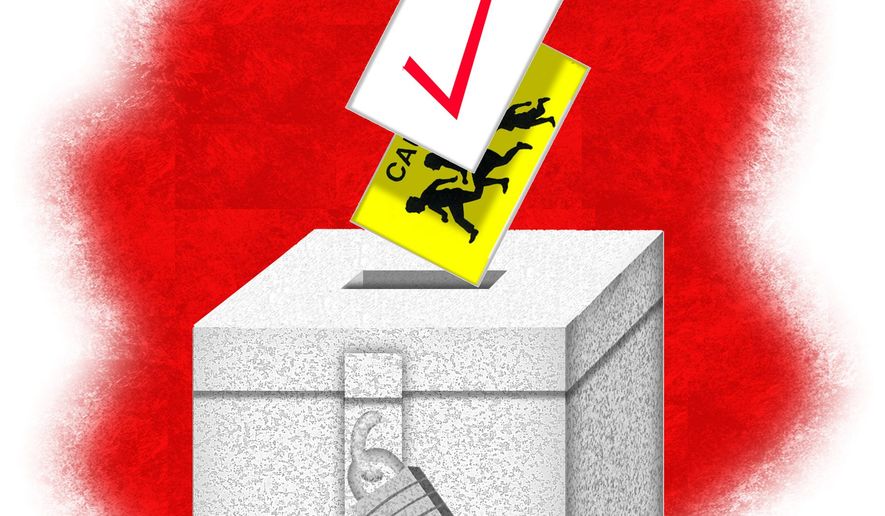OPINION:
Officials with the Nevada Secretary of State had a problem emerging on their hands in early 2020, and they knew it. The state had embarked on the grand experiment of automatically registering voters (AVR) as they were serviced by the Department of Motor Vehicles (DMV) and all the typical warnings of such systems were quickly coming true.
Election officials in Clark, Churchill, and Humboldt Counties were emailing about green card holders with driver’s licenses showing up in their offices complaining they were now registered to vote. Whether they presented foreign identification or simply declared to not be U.S. citizens at the DMV did not matter — they were still hitting the voter rolls. It wasn’t supposed to be this way. Proponents of AVR, and the Nevada DMV thereafter, promised that foreign nationals would be filtered out.
In emails disclosed to the Public Interest Legal Foundation, a Nevada secretary of state team leader wrote that “the last thing we all need” is for AVR to snag a noncitizen and therefore suggest it was acceptable for them to vote. They reminded colleagues how the secretary was keen to make sure that official mistakes did not lead to someone else’s naturalization troubles. One colleague agreed: At the very least, DMV could send an alert when they realize a mistaken transmission. Otherwise, they all have to wait for the immigrant to notice something is wrong before Immigration catches on.
When the secretary’s office raised their concerns with the DMV, things went how one would expect between a Republican SOS and a DMV under the direct control of a Democratic governor. There are dozens of disclosed pages of bureaucratic passive aggression via email. Worse: The DMV was refusing to show that their noncitizen filters were in fact real and working.
In 2021, H.R. 1 promises to export this kind of bureaucratic fiasco to every state in the union. But under this bill, nearly every government database — not just DMVs — are haphazardly pushing information to voter rolls with the clumsy dehumanization that only automatic data transfers can bring.
Nevada election officials and others in these noncitizen voting situations try to work backwards when an admission of improper registration is shared. They go all the way to the checkbox on the registration application about citizenship status. When the box was checked YES, the noncitizen typically couldn’t read the English, they say. When it reads NO, a bureaucrat unquestionably messed up. H.R. 1 kneecaps that exercise in the future.
A section of the bill prohibits government agencies from “collecting, retaining, disclosing” records where noncitizens identify themselves as such. For officials and private research groups looking backward, those paper trails go cold at the point the ineligible person is registered to vote. Simply put, if a noncitizen admits their status and is registered anyhow, the initiating document is in the memory hole.
Any H.R. 1 proponent who reassures the concerned public that noncitizens won’t be registered has not read the bill. A separate section prevents USCIS officials from holding an existing voter record against a noncitizen seeking to naturalize. Law enforcement are separately prohibited from pursuing auto-registered noncitizen voters for criminal charges. However, there are no penalties outlined for the government employees who set these chains of ineligible voting activity into motion.
Where states like Nevada and California promised filters to keep ineligible persons out of their AVR systems, Capitol Hill Democrats drop the charade and build protections for those who inevitably become registered contrary to existing law.
The intellectual drivers behind H.R. 1 have given up on the American experiment as we know it. Tenets like Federalism, state election powers, even Election Day itself are outmoded and proven to uphold all of the structural -isms plaguing society, they argue. They ditched big idea policies long ago because they do not believe they are possible until major process changes are made — and H.R. 1 goes a long way to deliver the goods. Those striving for social justice can only break through to a higher plane of social righteousness if they can first change the voting rules everywhere. Win some, lose some is no longer acceptable.
Fellow critics of H.R. 1, despite their best intentions, might fall into the trap of arguing the bill could lead to voter fraud. In reality, the bill blurs facts and data to the point that a lawful vote, a mistaken one, and outright fraud will look and count the same. You can prosecute a voter fraud case. Good luck indicting a “software glitch” borne by a federal law that registers and therefore entices foreign nationals to vote. That’s progress — the sustainable kind.
• Logan Churchwell is the communications and research director for the Public Interest Legal Foundation.




Please read our comment policy before commenting.